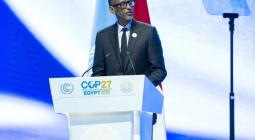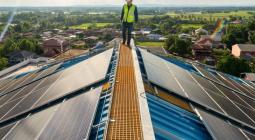Africa’s Green Economy Summit opens in Cape Town,from 21 February
Africa’s Green Economy Summit (AGES) returns to Cape Town, South Africa, from February 21 to 24. It is the only event of its kind to connect investors, governments and impact project leaders, to catalyze a just and sustainable transition on the continent. AGES is therefore three days of debate, partnership negotiations and exploration within the rainbow nation.
Faced with the energy consequences of the war in Ukraine and the many natural disasters (cyclones, floods and prolonged droughts) that are undermining the livelihoods of many populations, several African countries are feeling the pinch. It is against this backdrop that one of the continent’s leading events is proposing a “green” response to inflation, which is on the rise just about everywhere (60.6% in Zimbabwe, 26.1% in Sierra Leone, figures from the African Development Bank).
Africa’s Green Economy Summit (AGES) takes place from February 21 to 23, in Cape Town, South Africa, a city renowned for the dynamism of its 4.6 million inhabitants. Over 3 days, local elected officials, political decision-makers, start-ups, corporates and a host of investors (Agence Française de Développement , Nedbank CIB, World Bank, etc.) from across Africa and beyond will discuss the theme of “mobilizing investment for green growth”.
The energy transition
The aim is to assess the progress made in the fields of electromobility and industrial decarbonization, which form the basis of the energy transition advocated in the Paris Agreement. In this respect, Cape Town Executive Mayor Geordin Hill-Lewis will be emphasizing “urban transformation through the prism of new partnerships” to harness the potential of solar, wind and hydroelectric power, as well as green hydrogen, which is currently all the rage.
To this end, 30 start-ups will be pitching and demonstrating their green and climate-friendly ideas and solutions to eager investors. This initiative has attracted a start-up such as BasiGo, which will be represented by co-founder Jonathan Green. In response to transport pollution accentuated by diesel, the 2022 winner of the Keeling Curve Prize for ecological transition is assembling all-electric buses in Nairobi, Kenya. This is a highly promising sector, insofar as the value chain for electric batteries is expected to be worth up to 5.3 billion dollars if Africa makes the most of its natural reserves (cobalt in the Democratic Republic of Congo, lithium in Morocco), which are essential for the automotive giants that are already converting to “all-electric”.
Climate finance, technological progress and the carbon market
The annual climate finance deficit, estimated at $213.4 billion, will also be discussed, as well as technological progress, which is essential for sustainable development, given that the United Nations’ demographic forecasts predict a population of 2.5 billion in Africa by 2050, and the subsequent increase in demand for basic services (education, sanitation etc.). What’s more, the host city has been ranked the “smartest” on the continent by the American magazine Forbes.
To address all these issues, the Vuka Group, which has been organizing AGES and many other international meetings for the past 20 years, has carefully selected some 70 high-level panelists. These include Catiana Garcia-Kilroy, a finance specialist with the World Bank Group, who will lead a panel discussion on carbon credit markets, which are crucial to the transition to a green economy in Africa.
The expertise of Mallé Fofana, Africa Director of the Global Green Growth Institute (GGGI), is also expected. Indeed, the GGGI, a key partner of AGES, is co-hosting a round table with the African Union (AU) on the theme: Scaling up green investments to combat climate change. The aim is “to offer AU member states and high-level stakeholders the opportunity to explore the potential of green investments and financing instruments for climate resilience on the continent”, says the institution whose voice counts in climate negotiations worldwide.
Circular economy discussed in the presence of international partners
Water stress, which dries up harvests and compromises the drinking water supply of 220 million Africans, will also be discussed at the Summit, along with the circular economy. And this at a time when 90% of the 174 million tonnes of waste produced annually on the continent (UN Habitat figures) end up in unauthorized landfill sites.
In view of all these major challenges, it’s hardly surprising that this ambitious second edition of AGES has as partners the asset manager Sanlam Investments, the African Union (AU) Commission, which has adopted a vast green recovery program, and the United States Agency for International Development (USAID), one of the leading financiers of the ecological transition south of the Sahara, to name but a few.
Cover photo: By AFRIK21





